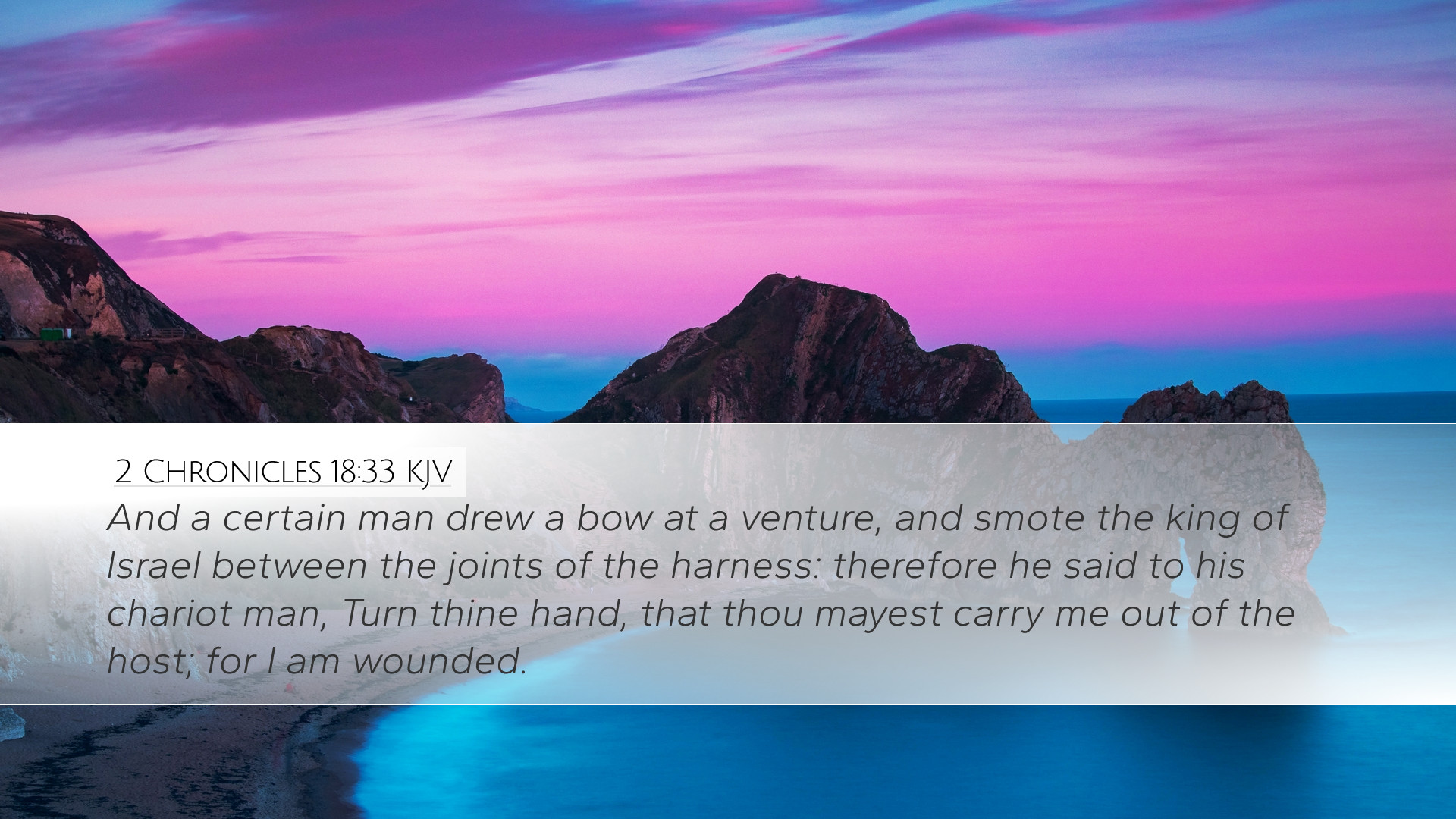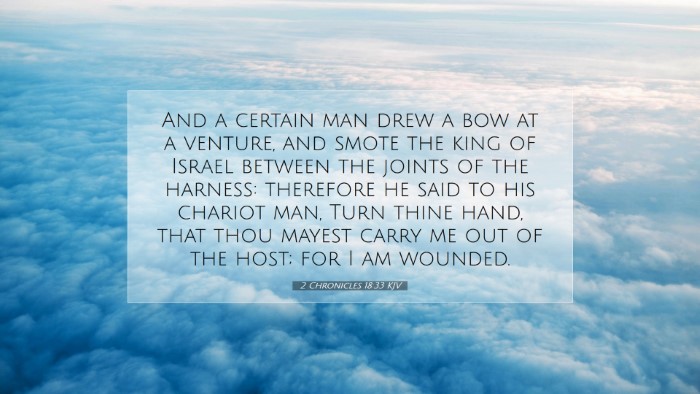Commentary on 2 Chronicles 18:33
Verse Context: 2 Chronicles 18:33 speaks to a pivotal moment during the conflict between Israel and Judah, specifically detailing the fate of King Ahab of Israel. This passage highlights the unfolding of divine judgment and illustrates the tension between human intentions and God's sovereign will.
Historical Background
The interaction between the kingdoms of Israel and Judah is critical for understanding this verse. Ahab, the king of Israel, was known for his idolatry and opposition to God's prophets, particularly Elijah. Jehoshaphat, king of Judah, sought to ally with Ahab, illustrating a complex relationship that often stirred conflict yet also sought peace.
Matthew Henry's Insights
Matthew Henry emphasizes the tragic irony within this narrative. He notes that while Ahab attempted to conceal his identity by dressing as a common soldier, the Lord used a stray arrow to accomplish divine judgment upon him. Henry reflects on this as true testimony that one cannot escape the decree of God, no matter the cunning or disguise used to evade it.
Key Observations:
- Divine Providence: Henry underscores that God's providence governs all affairs, which includes the downfall of wicked rulers. Ahab's attempt to hide himself only serves to illustrate human folly against divine omniscience.
- The Role of Human Choices: Ahab's decision to ignore Micaiah's prophecy and trust in false prophets ultimately led to his demise. This serves as a reminder of the consequences of turning away from God's truth.
- Judgment as a Reality: The passage underscores that divine judgment is inevitable for those who oppose God's will, as Ahab did throughout his reign.
Albert Barnes' Commentary
Albert Barnes provides a detailed analysis of the significance of the arrow that struck Ahab. He notes that the randomness of the arrow represents God's hand at work, ensuring the fulfillment of prophecy despite Ahab's efforts to avoid fate.
Key Insights:
- God's Sovereignty: Barnes describes the event as a vivid demonstration of God's sovereignty over human affairs, reminding readers that God can use even the most seemingly insignificant actions (like a stray arrow) to fulfill His plans.
- Consequences of Leadership: He points out the heavy burden of kingship and the repercussions of unrighteous leadership on a nation, as Ahab’s actions led to his downfall and the suffering of Israel.
- Moral and Spiritual Lessons: Barnes elaborates that this story provides vital lessons regarding discernment in choosing whom to listen to regarding spiritual insights. Ahab’s choice of prophets is a critical factor in his fate.
Adam Clarke's Exegesis
Adam Clarke’s interpretation of this passage delves into the theological implications of the event, highlighting the significance of prophetic fulfillment. He states that the death of Ahab signifies the assurance of God’s promises, whether they be of grace or judgment.
Theological Reflections:
- Prophetic Confirmation: Clarke emphasizes the importance of prophecy in affirming God’s plans and purposes. The fulfillment of Micaiah's prophecy in this event reinforces the legitimacy of true prophetic voices.
- Human Accountability: He discusses the accountability of Ahab for his choices, suggesting that human beings are responsible for the decisions they make, particularly in relation to spiritual guidance.
- God's Ultimate Authority: The passage ultimately declares that God's will is accomplished regardless of human schemes, urging leaders to recognize their role in the divine plan.
Conclusion
The study of 2 Chronicles 18:33, drawing from the insights of Matthew Henry, Albert Barnes, and Adam Clarke, unveils a profound truth about divine sovereignty and human agency. It serves as a timely reminder to pastors, theologians, and scholars about the weight of leadership, the consequences of disobedience, and the certainty of God’s judgment. Ahab's story resonates as a cautionary tale that highlights the importance of discernment in spiritual matters and the assurance that God's plans are unthwarted by human efforts to evade them.


